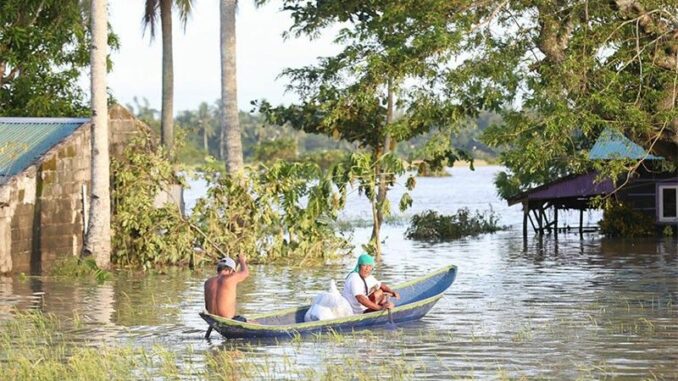
MANILA, Philippines — Climate change under a high-end greenhouse gas emissions scenario may lead to an 18-percent reduction in the Philippines’ gross domestic product (GDP) by 2070, according to the Asian Development Bank (ADB).
This was among the findings in the ADB’s inaugural Asia-Pacific Climate Report, which details the damaging impacts threatening the region.
In the Philippines, ADB senior economist David Raitzer said that “about half of losses come from sea level rise.”
“And then a larger share than at the regional average would come from natural resource-based sectors. So agriculture, fisheries, forestry,” he said in a webinar.
The report also showed that economic losses in the Philippines due to climate change could rise and reach 40 percent in 2100.
In Asia-Pacific, the ADB said climate change under a high-end emissions scenario could lead to a 17-percent reduction in GDP by 2070.
By 2100, ADB principal economist Yi Jiang said the potential GDP loss in Asia-Pacific could be higher, reaching 41 percent.
“The primary channel of loss is sea level rise, followed by labor productivity losses and flooding,” he said.
Among sectors, he said agriculture is expected to be the most directly affected.
“The nature of the shocks and where they occur imply that the lowest income countries and the population are most vulnerable,” he said.
People in Asia-Pacific recognize the threat posed by climate change with a survey conducted by the ADB showing 91 percent view climate change as a serious problem.
In the Philippines, 90 percent of the respondents said they see climate change as a serious problem and 86 percent are already feeling its impact now or expect to be affected within the next 10 years.
While 70 percent of those in the Philippines said the government is already taking action to reduce climate change, 59 percent see the need for investments in low-emission and resilient infrastructure.
The survey also showed that 45 percent of respondents in the Philippines support a carbon tax and 43 percent are in favor of laws and regulations limiting emissions.
“Climate change has supercharged the devastation from tropical storms, heat waves and floods in the region, contributing to unprecedented economic challenges and human suffering,” ADB president Masatsugu Asakawa said.
“Urgent, well-coordinated climate action that addresses these impacts is needed before it is too late,” he added.
Apart from accelerated adaptation responses, the ADB sees the need to upscale adaptation-focused climate finance.
The ADB estimates that regional countries will need $102 billion to $431 billion annually to adapt to global warming, far exceeding the $34 billion in adaptation finance tracked in the region from 2021 to 2022.
While government regulation reforms and enhanced recognition of climate risks are helping attract new sources of private climate capital, the ADB also said more private investment flows are needed.


Be the first to comment